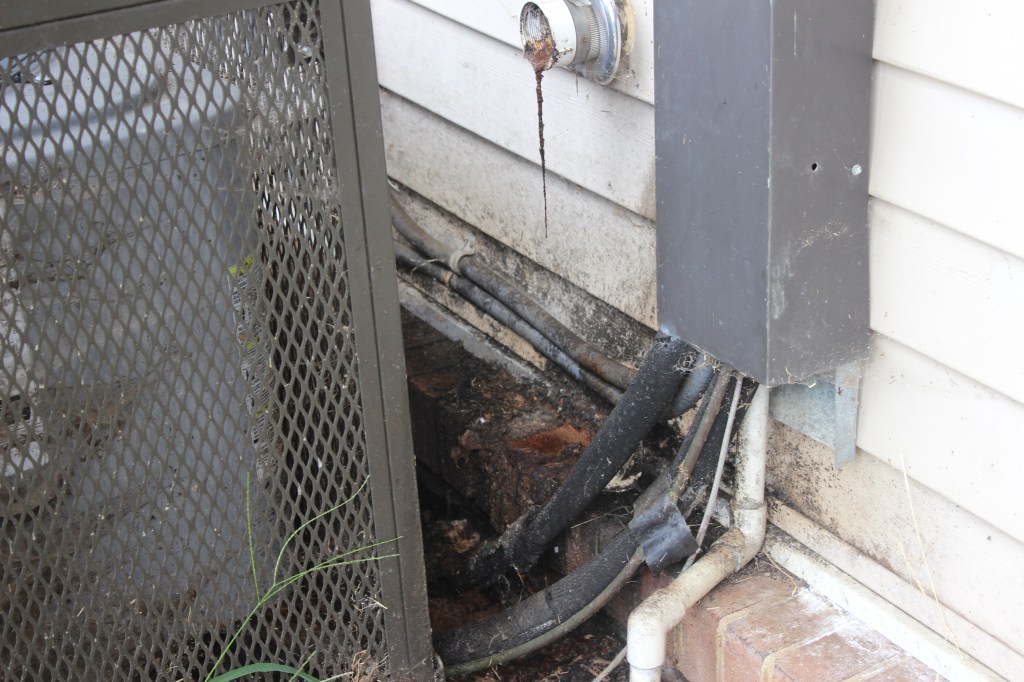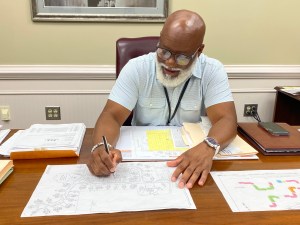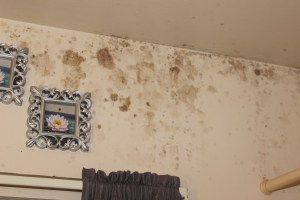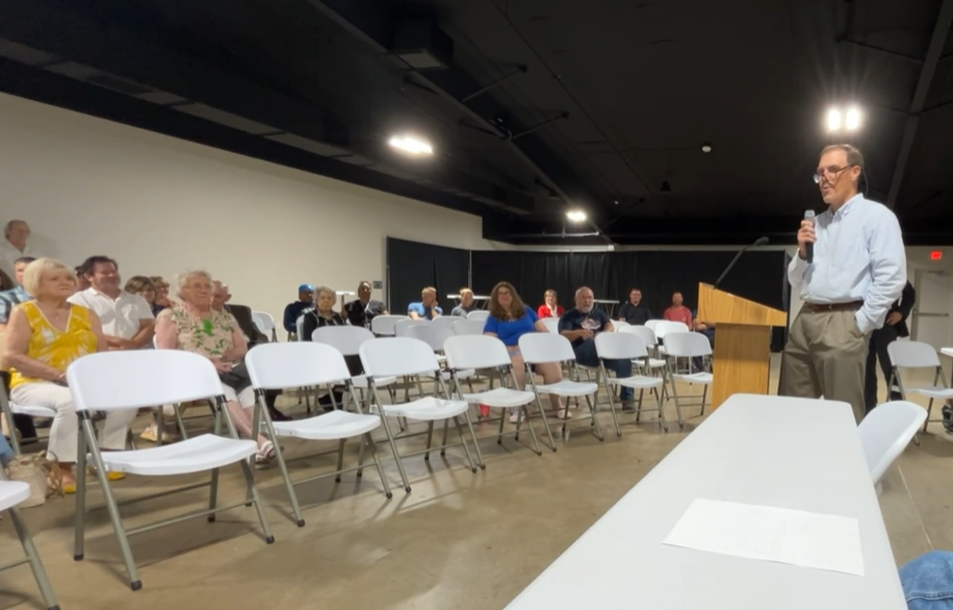Albemarle public housing director assists residents impacted by mold, sewage problems
Published 2:38 pm Friday, August 26, 2022

- A city representative found sewage that had leaked out from one of Amhurst Gardens’ apartment units.
|
Getting your Trinity Audio player ready...
|
Albemarle Public Housing Director Dr. Kim Scott was touring Amhurst Gardens in January when he stepped in what he thought was a pool of water.
It was sewage leaking from behind one of the apartment units.
Scott, who had just started the job, said he was concerned after learning of several collapsed pipes underneath many of the units — an ongoing issue that had persisted for many years.
Trending
He talked with a maintenance worker who told him there had been sewage problems in the community for at least six years, which left Scott dumbfounded. The issue had been raised to previous housing directors, Scott was told, but never seemed to be a priority.
“It was just disturbing to me that this was something that had lasted for several years and no one had addressed it,” Scott said.
Scott said he notified City Manager Michael Ferris and several council members about the collapsed pipes. They visited Amhurst Gardens in February and were surprised about the issue, he recalled, saying they asked why they had never been informed about the problem.
Scott was initially told by a public housing specialist on the city’s staff, who had oversight over the conditions of the apartments, that just 10 units needed to be repaired.
However, after a review of past work orders revealing which units received the most maintenance calls, along with plumbers investigating several properties, at least 22 units on South Bell Avenue along with Inger and Grigg streets were identified as having plumbing problems. The total represents approximately 25 to 30 families, Scott said, about 15 percent of the 150 units in Amhurst Gardens.
Scott insists the units could already have been renovated had he known about the full extent of the problem when he arrived. The public housing specialist is no longer employed with the city, Scott said.
Trending
“Had we had someone in place who would have been conducting consistent inspections, a lot of this, I hope, would have been taken care of a long time ago,” he said.
Six of the units also have HVAC issues, including air conditioning units not switching to heat, according to notes from a May 16 contractors meeting provided to The Stanly News & Press.
Scott and his staff are working with Stogner Architecture in Rockingham to determine the severity of the problem and hire contractors to renovate the properties. Albemarle City Council approved a two-year contract with Stogner at it’s July 11 meeting. Since 1991, Stogner has worked on 18 public housing projects within the city, according to its website.
During the meeting, Mayor Pro-Tem Martha Sue Hall said she wanted to find out when the public housing department “first knew about such problems.” The SNAP recently asked Scott the same question, but he said he did not know when the department first became aware of the sewage issue.
Stogner will work with the public housing department to help identify the existing condition of cast iron sewer systems in the units and replace the existing systems with polyvinyl chloride (PVC) piping. With facilities being more than 50 years old — the housing community has been around since 1971 — Stogner will provide additional insight into addressing modernization of the apartments.
The families living in the impacted properties will be temporarily relocated to vacant units on Inger Street. While things can change, depending on the severity of existing problems or additional damage discovered, Scott said he hopes to have the units fully renovated in three to six months.
As part of a revised five-year capital action plan (2020-2024) approved by the City Council June 21 and the U.S. Department of Housing and Urban Development earlier this month, roughly $543,000 has been allocated to improve the public housing community this year, the bulk of which will address the damaged units. The major projects for the current fiscal year include:
- Renovating kitchens in 20 apartments — $160,000;
- Renovating bathrooms in 20 apartments — $130,000;
- Replacing plumbing under the foundation in 20 apartments — $70,081;
- Replacing kitchen appliances, including refrigerators — $42,500;
- Replacing unit flooring in 25 apartments — $40,000;
- Replacing water heaters in 20 apartments — $25,000; and
- Replacing unit lighting in 20 apartments — $10,000.
The majority of the funds allocated for fiscal years 2023 and 2024, which also total about $543,000 each, will go to the same projects mentioned above.
The city said it is confident in Scott’s plans to improve the public housing community in the years to come.
“Since January, when Dr. Scott took over his leadership role at the Department of Public Housing, he has connected with residents about their concerns,” Ferris said. “We now look forward to seeing Dr. Scott embrace his responsibility to develop a plan that increases accountability in the operations he manages. We’re eager to see Dr. Scott’s department produce positive change he was hired to bring.”

Dr. Kim Scott was installed as Albemarle’s new public housing director in January.
‘I can’t live like this too much longer’
The work to improve the units affected by the collapsed pipes cannot come soon enough for the residents, some of whom are struggling to survive.
Alfreda Miller has lived with her children on Inger Street for four years. During that time, she said toilets and bathtubs in her two bathrooms overflow with sewage and feces every few months.
Her apartment has been identified by Scott as being “by far in the worst” condition.
Miller, 38, has thrown away countless towels and blankets trying to soak up the water. Her children help scrub the tubs after each incident.
“I worked in a nursing field,” she said. “I know what poop looks like.”
The putrid smell lingers in the house for several days, forcing Miller to keep her doors open for fresh air. Her family has discarded clothes because of the pungent odor.
“I will not put that stuff in my washing machine,” she said.
The conditions have gotten so bad Miller is afraid to invite people into her apartment.
“It’s really embarrassing to the point where you’re ashamed to bring people to your house because you don’t know whether or not you’re going to have a plumbing issue,” she said. “I can’t live like this too much longer.”
The conditions are routine for Miller and her family, which Scott said was unacceptable.
“It hits me so hard to the point of, I’m embarrassed because I know this is under my watch, but also I’m like, ‘What can I do to fix this?’ ” he said.
Victoria Ingram, an Amhurst Gardens resident for more than 30 years, has stopped drinking water from her tap because she said it has an odor, irritates her stomach and makes her feel nauseated. She relies on bottled water.
“Sometimes I feel like I want to throw up but I can’t throw up,” said Ingram, who lives on South Bell Avenue.
Both Miller and Ingram said they have mold in their homes, which makes them fear for any potential long-term health effects. Miller, who is disabled and has diabetes, said she is worried for her 9-year-old daughter, who has asthma. She said she believes her daughter’s condition has worsened since the family has lived there.
Scott said mold has been detected in a “large majority” of the 22 units, a primary reason why the kitchens and bathrooms are scheduled to be renovated. An assessment performed by Charlotte-based Surpass Cleaning and Maintenance in June revealed stachybotrys and chaetomium, two types of mold which can be detrimental to one’s health. Both have been identified in two units on Griggs Street, according to a report shared with the SNAP.

Victoria Ingram is worried about the mold in her bathroom.
While not all residents in the 22 units are in the same situation as Miller, everyone has been impacted in some way. Scott said he is working with Stogner to develop a plan “to address this as if everybody has a health issue because it is a health and safety concern.”
Bringing up concerns before City Council
Residents have talked with Scott about problems with their living conditions, but have been reticent to contact other city officials, including council members, having a fear of potential backlash.
“They feel like you’re pointing the blame on them when you’re not really pointing the blame on them. You’re trying to shine a light on the problem,” Miller said.
During the Aug. 15 city council meeting, however, several residents, including Ingram, spoke about the issues they face, including the sewage problem and mold.
Many council members said they were surprised by the issues raised.
“I’ve been on this council since 2014 and I can promise you right now that I have never heard the vivid details of the issues and challenges and opportunities that we have within our public housing department,” Bill Aldridge said.
The residents’ perspectives came as the council was planning to approve the City’s written responses to a recent compliance report from HUD’s Greensboro field office detailing several allegations, including mismanagement of HUD funds and not following certain procedures, within the public housing department.
Mayor Ronnie Michael said HUD’s findings “were based on a flawed understanding of how the Albemarle Department of Public Housing is structured under the City,”adding that HUD developed its findings “based on the erroneous belief that the Albemarle Department of Public Housing operated as a traditional housing authority.”
Hall, the mayor pro-tem, said Scott has been the first director to contact the council about problems within the public housing community.
“I’m glad we’re hearing this and I’m sorry we’re just now hearing this,” she said.
Council members stated they are working with Scott to find a time when members can come to Amhurst Gardens to speak with residents and learn more about issues impacting them.







